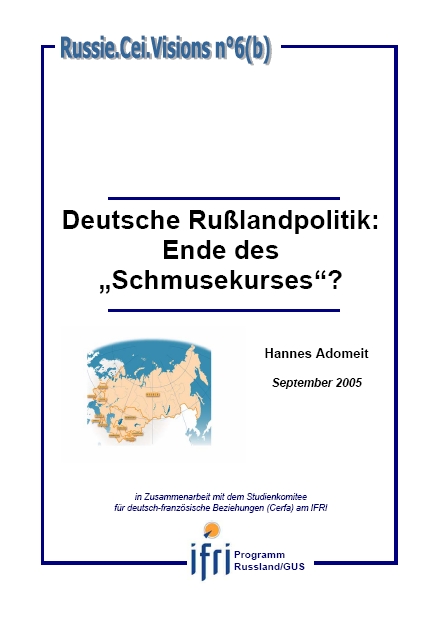Deutsche Rußlandpolitik: Ende des „Schmusekurses

Doppelte Note du Cerfa, 26 (a) und 26 (b), September 2005, in Kooperation mit dem Programm Russland/GUS
Note du Cerfa, n° 26 (a), septembre 2005 Hannes Adomeit, "Deutsche Rußlandpolitik: Ende des „Schmusekurses?"
Note du Cerfa, n° 26 (b), septembre 2005 Andreï Zagorski, "Russland und Deutschland: Kontinuität und Wandel"
Die Entwicklungen in Putins Russland weg von Democratie und Rechtsstaat haben auch die deutsche Russlandpolitik auf den Prüfstand gestellt. So haben Repräsentanten der Oppositionsparteien CDU/SCU und FDP im Vorfelf der Wahl zum Deutschen Bundestag am 18. September zu arkennen gegeben, dass sie die von Bundeskanzler Schröder gegenüber Russland eingenommene Haltung für verfehlt halten. In den neuen EU-Mitgliedstaaten Ostmitteleuropas wird Deutschland vorgeworfen, es schlage abweichend von der EU einen Sonderweg ein, es strebe ein Sonderverhältnis zu Russlan an. Der vorliegende Artikel geht der Frage nach, ob diese Kritik zutreffend ist und was hinter der von Bundeskanzler Schröder und Präsident Putin immer wieder beschworenen "strategischen Partnerschaft" steckt.
Hannes Adomeit is seit 1997 wissenschaftlicher Mitarbeiter und Fachmann für Russlandfragen am Forschungsinstutut für Internationale Politik und Sicherheit der SWP in Berlin.
Download the full analysis
This page contains only a summary of our work. If you would like to have access to all the information from our research on the subject, you can download the full version in PDF format.
Deutsche Rußlandpolitik: Ende des „Schmusekurses
Related centers and programs
Discover our other research centers and programsFind out more
Discover all our analysesMerz’ European Policy-making: The End of the ‘German Vote’?
Friedrich Merz’s European ambition is to turn Germany, long seen as hesitant into a leading actor within the European Union (EU). To that end, he has pledged to end the “German vote,” a phenomenon that epitomizes the paradox of a country both indispensable and frequently absent from European decision-making.

Securing critical raw material (CRM) value chains – a prerequisite for Europe’s technological resilience
At the heart of economic security, technological resilience is a backbone of the European Union’s (EU) competitiveness. The EU’s energy and digital transitions depend on critical raw materials (CRM).

Reconciling competitiveness and demographic change: a Franco-German imperative
France and Germany are facing parallel demographic shifts that could reshape the future of their economies and their social models. These shifts reflect broader European patterns but are magnified by the central role both nations play in EU governance and competitiveness.
Taking the Pulse: Does France's Political Crisis Weaken Europe's Geopolitical Hand?
While the EU tries to navigate a myriad international challenges, France is experiencing historic political disarray. What impact will instability in Paris have on Europe's geostrategic capacity?









